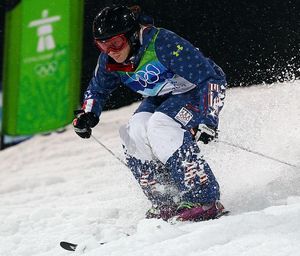NBC's Two-Day Vancouver Olympic Viewership Tops Torino By One-Third
NBC's coverage of the Winter Olympics is off to a good start, outpacing its viewership performance over the first two days from the 2006 Games by one-third.
The network averaged a 14.0 rating/25 share and 26.2 million viewers for its Feb. 13 presentation, 13% above the 23.2 million who watched the second night of the Torino Olympics in 2006, according to Nielsen data. The Feb. 13 telecast outpointed the second night of the 2006 Games, which scored a 13.5 rating/23 share, by 4%
Combined with the opening ceremony, NBC averaged 30 million viewers for the first two days of the Vancouver Games, the most for a non-U.S. Winter Olympics since the tabloid-fueled 1994 Lillehammer Games (39.9 million). The 30 million is 33% higher than the two-day average viewership from Torino (22.6 million).
The 15.9/28 average household rating to date is up 21% from Torino (13.1/22) and the best for a non-U.S. Winter Games since Lillehammer (25.2/38). NBC has guaranteed advertisers a 14.0 average in primetime.
All told, NBC's Saturday night telecast was seen in part by 55 million total viewers, 6 million more than the first night of competition from Torino (49 million).

Gauged on a metered market basis, the Mountain Time Zone averaged a 19.9 rating/35 share for the first two days in primetime, compared with 17.8/34 for the Pacific and 17.3/29 and 17.2/28 for the Central and Eastern, respectively.
The network's Saturday live afternoon coverage from 2 p.m.-6 p.m. (ET) -- featuring Al Michaels' debut as daytime host, returning to the Olympics for the first time in 22 years -- and covering speed skating, ski jumping and biathlon drew 13.1 million viewers, a 25% advance from the first Saturday afternoon in Torino (10.5 million). The Italian City is six hours ahead of the Eastern Time Zone.
Through Saturday, 97 million people have watched some part of the Vancouver Olympics Winter Games on the networks, according to officials. That's 9 million more than the 88 million who watched the first two days of Torino and just short of the 100 million for the tabloid-fueled 1994 Lillehammer Games, according to Nielsen data.
NBC officials are encouraged for a variety of reasons. Saturday is historically the lowest viewing night of the week, while the Feb. 13 delivery exceeded every night of the Games from Torino, Italy. Moreover, the equivalent night in Torino showcased figure skating action, always among the most popular Winter Games sports, in the form of the short pairs program, as well as downhill skiing.
"It's simply remarkable for a Saturday night, television's least-watched night, to surpass the audience total for every one of the 17 nights of the last Winter Olympics without the benefit of figure skating - the single biggest event in a Winter Games - which was the featured event of the first Saturday night in Torino," said Dick Ebersol, Chairman, NBC Universal Sports and Olympics.
While NBC didn't have figure skating on Feb. 13, it showed Americans winning four medals. Hannah Kearney won the gold and Shannon Bahrke the bronze in the women's mogul skiing competition, bracketing the favorite, Canadian Jennifer Heil, who took home silver.
Apolo Ohno and J.R. Celski captured the silver and bronze in the short-track speedskating 1,500 meter final, when a pair of Korean skaters crashed on the final lap. The medal made Ohno the most-decorated Olympic short-track speedskater in Winter Olympic history and knotted him with Bonnie Blair as the top American ever with six career medals.
Digitally, NBCOlympics.com has averaged 4.5 million unique users over the first two days, 350% more than 1.02 million for the equivalent span in Torino. The site has also delivered 4.3 million video streams to date - 691% more than the 543,000 on Torino's first two days
Multichannel Newsletter
The smarter way to stay on top of the multichannel video marketplace. Sign up below.
